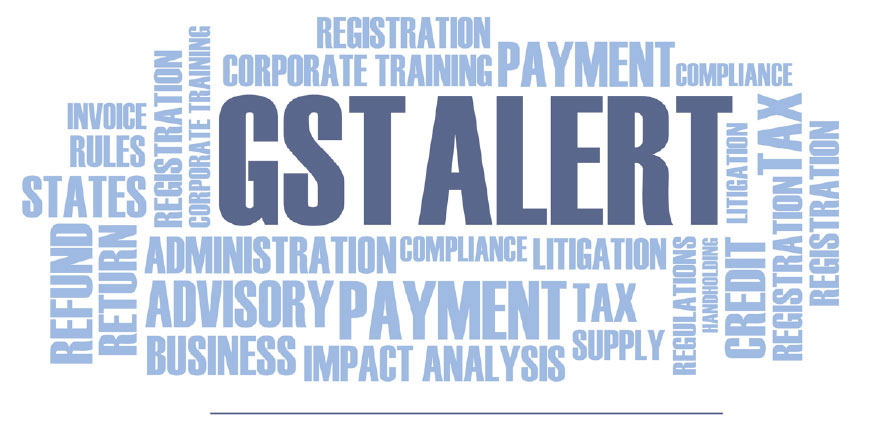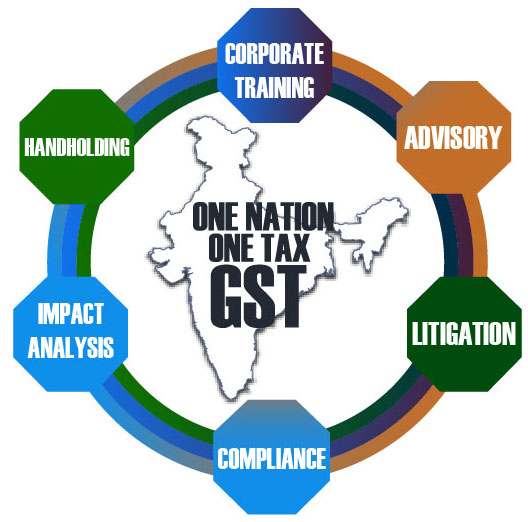Dated 12th July, 2019

A wind of relief for innocent buyers for non-payment of Tax by their defaulting sellers
Introduction:
With diverse pronouncement made by High Courts in respect of inherent powers given to GST officers under the Central Goods and Services Tax Act, 2017 (here-in-after referred to as “CGST”) towards powers to arrest, Hon’ble Supreme Court finally settles the divergent views. This article discusses about relevant GST provisions, interpretation made by Courts and conclusion drawn by the Apex Court.
Many cases or situations are observed where there is difference in Input Tax Credit (ITC) claimed in GSTR 3b and ITC available in GSTR-2a. This is due to the reason – Taxes are paid by the recipient to the supplier but not deposited by the supplier to the government. On Combined reading of the following Sections 16(2)(c), 37, 38, 73 of Central GST Act (CGST),2017, a buyer who avails ITC for amount paid to his seller (both invoice amount and tax) will be denied for the credit, if the seller does not deposit tax with the appropriate Government authorities and disclosed in his GSTR-1 return. Recently, the Hon’ble Supreme Court in the case of Commissioner of Trade & Taxes, Delhi and others Vs. Arise India Limited and others [TS-2-SC-2018- VAT], has dismissed the Special Leave Petition filed by the Revenue against the decision of the Hon’ble High Court of Delhi in the case of Arise India Limited and others Vs. Commissioner of Trade & Taxes, Delhi and others [TS314-HC-2017(Del)-VAT] (“Arise India case”). The Hon’ble High Court of Delhi held Section 9(2)(g) of Delhi VAT Act to the extent it disallows Input tax credit(“ITC”) to purchaser due to default of selling dealer in depositing tax, as violative of Articles 14 and 19(1)(g) of the Constitution of India.
Denying the credit of ITC of the tax paid by recipient, it will go against article 14 of the Constitution. It says, "Equality before law – The State shall not deny to any person equality before the law or the equal protection of the laws within the territory of India Prohibition of discrimination on grounds of religion, race, caste, sex or place of birth." Such credit denial is also against Article 19(1)(g) of Constitution of India. It says "All citizens shall have the right (g) to practise any profession, or to carry on any occupation, trade or business." This measure against the purchasing dealer is arbitrary, irrational and duly harsh and, therefore violative of Article 14 and 19(1)(g)of the Constitution;
Revenue’s contention:
Department urge that arbitrariness cannot be a ground for challenging the statute as being violative of Article 14 of the Constitution. Further, mere hardship caused by the impossibility of compliance of the provisions cannot be a ground for striking down a statue; Where a fiscal statue was being challenged, a greater leeway had to be given to the legislature and there had to be a presumption of soundness of the legislative policy. It was argued, the court is not to question legislative wisdom in such matters. The Department referred to the note prepared for consideration of the cabinet prior to the insertion of Section 9(2)(g) of the DVAT Act.
Where a fiscal statue was being challenged, a greater leeway had to be given to the legislature and there had to be a presumption of soundness of the legislative policy. It was argued, the court is not to question legislative wisdom in such matters. The Department referred to the note prepared for consideration of the cabinet prior to the insertion of Section 9(2)(g) of the DVAT Act.
Contention of the Ho’ble High Court
The Department is not allowed to invoke the provisions of Section 9(2)(g) of the DVAT Act to deny ITC to a purchasing dealer who has bona fide entered into a purchase transaction with a registered selling dealer who has issued a tax invoice reflecting the TIN number.
In the event that selling dealer fails to deposit the tax collected by him from the purchasing dealer, the remedy for the department would be to proceed against the selling dealer for recovery of such tax. Further, in cases where the department is satisfied that there is collusion of purchasing and selling dealer then proceeding under Section 40A of the DVAT Act can be initiated.
Conditions under which the Department can take action against the defaulting buyer:
Why the non-guilty buyer gets cut up for the GST Input Tax Credit (ITC) for the reason of non-payment of tax by the defaulting seller. There are many sections or instances which should allows the buyer to take ITC of the GST paid.
- Only when there is a wilful suppression of fact with the motive to evade Tax or duty , can be used against the buyer.
- The condition under Section 9(2)(g) of the DVAT Act that the selling dealer has ‘actually deposited’ should be read as selling dealer ‘ought to have deposited’ tax. Alternatively, the expression ‘dealer’ occurring therein should be read down to exclude a purchasing dealer who, on his part, has duly complied with the requirement under the DVAT Act;
- There are other statutory provisions available to the state to collect tax from the defaulting dealer whereby the Commissioner prepare and issue to the defaulting selling dealer a recovery certificate and thereafter recovers the amount specified in the certificate by attaching the movable and immovable property;
- The only requirement for availing the benefit of ITC is that he must ensure that the selling dealer is registered and the compliances are made with the requirement of the DVAT Act and the Rules made thereunder.
- If subsequent to the purchases made by the purchasing dealer, the registration of the selling dealer is cancelled, such cancellation cannot be given retrospective effect so as to deny the purchasing dealer the ITC in respect of the VAT paid by him;
- If there is no mismatch of the Annexure 2A and 2B, ITC cannot be denied;
- Penalty under Section 86(10) of the DVAT Act cannot be imposed unless it is shown that the return filed is misleading or deceptive;
- Penalty under Section 86(10) of the DVAT Act is not automatic and has to be preceded by the proper notice being served on the assessee and an effective opportunity of being heard given.
Some relevant case laws are:
- In the case of Commissioner Of Trade And Taxes Delhi Versus Arise India Limited (Special Leave to Appeal (C) No(s). 36750/2017) Hon’ble Supreme Court held that of Althaf Shoes (P) Ltd., vs. Assistant Commissioner (CT), Valluvarkottam Assessment Circle, Chennai6 reported in (2012) 50 VST 179 (Mad).
- Hon’ble Supreme Court in the case of Commissioner of Trade & Taxes, Delhi and others Vs. Arise India Limited and others[TS-2-SC-2018-VAT].
- The Punjab & Haryana High court has delivered a landmark judgment namely Gheru Lal Bal Chand Vs. State of Haryana and another Hon’ble High Court of Delhi in the case of Arise India Limited and others Vs. Commissioner of Trade & Taxes, Delhi and others [TS-314-HC-2017(Del)-VAT](“Arise India case”).
- Hon’ble Madras High Court in the case of State of Madras Vs. Raman & Co. [1974] 33 STC).
- Sri Vinayaga Agencies vs. Assistant Commissioner (CT), Vadapalani-I Assessment Circle, Chennai and anotherreported in (2013) 60 VST 283 (Mad).
- Hon’ble Madras High Court In the decision cited on the side of the petitioner in 2016-TIOL-489-HC-MAD-VAT (Britannia Industries Ltd v. the Deputy Commissioner (CT)-III (FAC), Chennai-8).
- In the case of M/s New Dhiraj Industries Vs. The State of Telangana in TA Nos. 161/2011, 162/2011, 248/2015 & 249/2015 dated 20.08.2018.
Wherein all most of all cases, Hon’ble Judges held that:
- "No liability can be fastened on the purchasing registered dealer on account of non-payment of tax by the selling registered dealer in the treasury unless it is fraudulent, or collusion or connivance with the registered selling dealer or its predecessors with the purchasing registered dealer are established".
- "ITC should not be denied to the bonafide purchasing dealer merely on fault of selling dealer. It should not be made the responsibility of the purchasing dealer to ensure that the tax is deposited by the selling dealer to the extent transaction is bonafide."
- "The officers who are passing the orders without following the settled law and the provision of the Act are just creating paper demands which is ultimately creating a mess for the revenue as well as the dealer as in these type of cases the department is not getting any revenue rather the machinery of the department is involved in unnecessary litigation and it has been rightly observed by the Hon’ble Judges of the Madras High Court reported in 92 STC Page No 621 that incompetent officer without knowledge of law are harmful both for the revenue and the state on the one hand and assessee on the other hand, if officers who do not have the knowledge and correct appreciation of the law and the principles upon which power to assess and realize tax is exercised, are appointed and allowed to hold office of responsibility, their such acts bring a bad name to the revenue administration so it is very necessary that while dealing with these situations the assessee should not be denied of his legitimate claim of input tax credit on flimsy grounds".
- "so long as the vendor is found to be a registered dealer on the files of the Revenue, the claim of the assessee for refund could not be rejected nor delayed. As already pointed out, the Revenue does not deny, as a matter of fact, that the assessee’s vendors are all registered appellants on the files of the Revenue and the assessee had also given the TIN number of these vendors."
- The benefit of input tax credit is denied to a bona fide purchaser. The reason of the default of the selling dealer over whom such purchasing dealer has no control. It should not be made the responsibility of the purchasing dealer to ensure that the tax is deposited by the selling dealer when the transaction is bona fide.

BT Associates is a premier indirect tax consultant in kolkata, delivering high quality services to client in the area of indirect taxation.GST idea is a unit of BT Associates formed to share knowledge on stakeholders. We cover entire gamut from technical papers to recent development including IT under GST


-
Founder Member
- Bhaskar Thakkar
- Chief Executive officer
- BT Associates, India
- thakkar@btassociate.com
BT Associates is a premier indirect tax consultant in kolkata, delivering high quality services to client in the area of indirect taxation.GST idea is a unit of BT Associates formed to share knowledge on stakeholders. We cover entire gamut from technical papers to recent development including IT under GST
Contact Us
BT Associates
Call: 033 2534-2717 /
033 6451-8729
Mail: enquiry@btassociate.com






